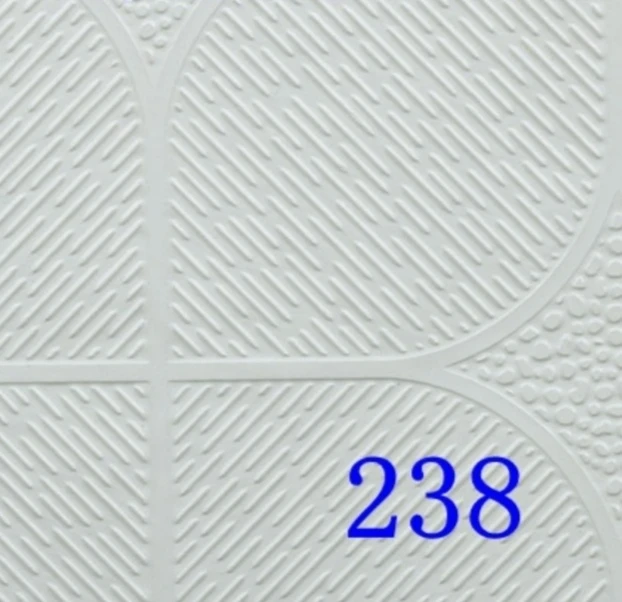- Afrikaans
- Albanian
- Amharic
- Arabic
- Armenian
- Azerbaijani
- Basque
- Belarusian
- Bengali
- Bosnian
- Bulgarian
- Catalan
- Cebuano
- Corsican
- Croatian
- Czech
- Danish
- Dutch
- English
- Esperanto
- Estonian
- French
- German
- Greek
- Hindi
- Indonesian
- irish
- Italian
- Japanese
- Korean
- Lao
- Malay
- Myanmar
- Norwegian
- Norwegian
- Polish
- Portuguese
- Romanian
- Russian
- Serbian
- Spanish
- Swedish
- Thai
- Turkish
- Ukrainian
- Uzbek
- Vietnamese
Nov . 17, 2024 02:05 Back to list
Affordable Mineral Fiber Ceiling Tiles Pricing for Your Next Project
Understanding Mineral Fiber Ceiling Tiles Benefits and Pricing
Mineral fiber ceiling tiles have become a popular choice for commercial and residential spaces, blending aesthetics with functionality. They are crafted from natural and synthetic fibers, providing an ideal solution for acoustic control, insulation, and fire resistance. In this article, we will explore the benefits of mineral fiber ceiling tiles, their pricing, and factors that influence their cost.
Advantages of Mineral Fiber Ceiling Tiles
One of the most significant benefits of mineral fiber ceiling tiles is their exceptional sound-absorbing properties. They are designed to reduce noise levels in a room, making them a perfect choice for offices, schools, and other public spaces where reducing noise is crucial for maintaining productivity. Additionally, these tiles can create a quieter environment, which is increasingly valued in our noisy world.
Another prominent advantage is their thermal insulation capability. Mineral fiber tiles can help regulate temperature by minimizing heat loss during colder months and keeping spaces cooler during the summer. This energy efficiency leads to lower heating and cooling costs, making them an environmentally friendly choice as well.
Fire resistance is another vital characteristic of mineral fiber ceiling tiles. They are typically made from materials designed to withstand high temperatures, which can significantly enhance the safety of any building, particularly in commercial setups. This fire-resistant quality is not only a safety feature but also a regulatory requirement in many building codes.
Pricing of Mineral Fiber Ceiling Tiles
The price of mineral fiber ceiling tiles can vary significantly based on several factors, including brand, quality, design, and the specific features they offer. On average, you can expect to pay between $1.50 to $5.00 per square foot for standard mineral fiber ceiling tiles. Premium options with additional features, such as enhanced acoustics or aesthetic designs, can cost more, sometimes reaching upwards of $10 per square foot.
mineral fiber ceiling tiles price

When considering the total cost, it's crucial to also account for installation expenses. Hiring a professional installer can add an additional $2 to $5 per square foot, depending on the complexity of the ceiling layout and local labor rates. DIY enthusiasts might opt to install tiles themselves, as the process is relatively straightforward, potentially saving on installation costs.
Factors Influencing Pricing
Several factors contribute to the price of mineral fiber ceiling tiles. Firstly, the thickness and density of the tiles can impact their sound absorption and thermal insulation capabilities, affecting overall pricing. Denser and thicker tiles often cost more but provide superior performance.
Secondly, aesthetic considerations can play a significant role in pricing. Tiles are available in a variety of textures, patterns, and colors, with custom designs typically commanding higher costs due to additional manufacturing processes.
Lastly, brand reputation often influences prices. Well-known manufacturers may charge a premium for their products, while lesser-known brands might offer more budget-friendly options. However, it’s essential to balance price with quality to ensure long-lasting satisfaction with your ceiling installation.
Conclusion
Mineral fiber ceiling tiles offer a blend of functionality and aesthetic appeal, making them an excellent choice for various applications. While prices can range widely based on several factors, understanding the benefits and key considerations can help homeowners and builders make informed decisions. Investing in quality mineral fiber ceiling tiles can enhance the overall environment of a space, providing comfort, safety, and energy efficiency for years to come.
-
Transform Interiors with PVC Gypsum Ceiling: A Stylish, Durable, and Moisture-Resistant SolutionNewsMay.19,2025
-
The Smart Interior Upgrade: Discover the Durability and Versatility of Gypsum Ceiling Access Panel SolutionsNewsMay.19,2025
-
The Smart Choice for Interior Design: Discover the Value of PVC Gypsum Ceiling SolutionsNewsMay.19,2025
-
Mineral Fiber Ceiling Tiles: The Smart Blend of Performance and AestheticsNewsMay.19,2025
-
Mineral Fiber Ceiling Tiles: The Superior Choice Over Gypsum for Sound and Fire SafetyNewsMay.19,2025
-
Mineral Fiber Ceiling Tiles: Eco-Friendly Strength and Style for Every CeilingNewsMay.19,2025







